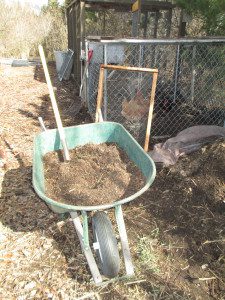Feb. 28 column: Soil

The soil in our gardens is one of the most easily overlooked components. But it’s so very important to the success of our gardens. We tend to take it for granted and just assume all is well with it. That’s not necessarily the case!
On the flip side, sometimes we do a bit too much to our soil. This can result in harming the tiny microorganisms that give life to our soil. I’ve been giving this a lot of thought lately and decided to highlight its importance in my writing.
Here is a link to my column in today’s edition of The Spokesman-Review: First step is taking care of soil. I take a close look at the life within our soil and steps we can take to nurture it. (you can also read my column lower in this post)
It all started with the book, Teaming with Microbes
I recently read the excellent book, “Teaming with Microbes.” I learned that by changing some of our gardening practices, we will have fertile, healthy gardens.
The great news is that these changes will require less work in your garden and less expense. Interested? Have a read and let me know if you intend to give it a try this year!
Soil garden column:
by Susan Mulvihill
How would you like to have a more productive garden with less work and expense? Have I gotten your attention?
I just read “Teaming with Microbes” (Timber Press, 220 pp., $24.95) by Jeff Lowenfels and Wayne Lewis. Now I’m anxious to change how I work with my soil and accomplish the above goals.
Old gardening traditions
We gardeners have been trained to rototill or turn over our soil every year. We’re also taught to add fertilizers to make our plants grow. Some folks also use chemicals to control weeds or plant diseases. As Lowenfels and Lewis point out, what happens in the soil under normal conditions makes all of this unnecessary.
“Most gardeners think of plants as only taking up nutrients through root systems and feeding the leaves,” they write. “Few realize that a great deal of the energy that results from photosynthesis in the leaves is actually used by plants to produce chemicals they secrete through their roots.”
Now bear with me while I explain why this is so important, preferably without making your eyes glaze over.
Why are the roots so important?
The root’s secretions contain carbohydrates and proteins that attract and feed good bacteria and fungi. These guys are very important because they protect plant roots from disease and deliver nutrients to the roots. They in turn are eaten by microbes (nematodes and protozoa). Their resulting excretions are also taken up as nutrients by plants.
But it doesn’t stop there. The microbes are eaten by arthropods: spiders and other predatory insects which also eat damaging insects on and around plants. Then there are the beneficial aspects of earthworms and their subterranean neighbors.
“Worms, together with insect larvae and burrowing animals, move through the soil in search of food and protection. They create pathways that allow air and water to enter and leave the soil,” the authors write.
As you can see, a whole lot is going on in the soil. Yet most of us are unaware of the vital activities taking place.
How can we reduce our gardening workloads and make our plants grow better?
The common practice of rototilling or turning over the soil damages its structure. That’s because it eliminates the air pockets created by worms and other subterranean critters. Yet the movement of air and water through the soil is essential to healthy plant life. Let’s avoid this practice and let earthworms and their friends aerate the soil for us.
Another important objective is to resist using chemicals, which includes fertilizers, herbicides and insecticides. As the authors explain, these products completely alter the “soil food web.” That term refers to the diverse life in and on the soil. As a result, bacteria and fungi won’t take up residence in a plant’s root zone. That in turn affects the rest of the microorganisms that depend on them. Simply put, chemicals throw off the balance in the soil. Wouldn’t it be nice to eliminate the expense of purchasing them?
The best way to foster a healthy soil food web is to supply microorganisms with nutrients. That will help them become established. This is particularly important if you have routinely used chemicals in your garden. While microorganisms are tiny, feeding them is pretty straightforward.
Build a compost pile using kitchen and garden waste (leaves, small branches, brush, untreated grass clippings, etc.). Place an inch of finished compost onto the surface of your garden beds every so often. The authors also recommend using homemade compost tea.
So, are you with me? Let’s take care of our soils and prepare for the best garden ever.

